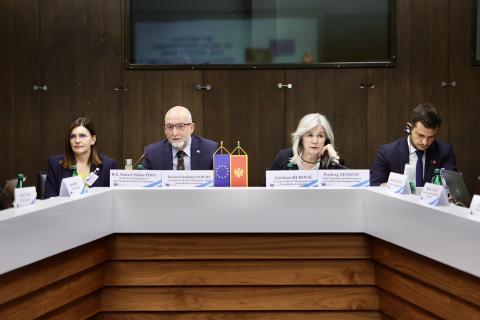European Economic
and Social Committee
The EU-Montenegro Joint Consultative Committee: Montenegro is advancing in the EU accession path
The 18th meeting of the EU-Montenegro Joint Consultative Committee (JCC), which took place in Podgorica today, sent a clear message to the EU institutions that Montenegro is firmly committed to becoming the 28th member by 2028. The JCC members encouraged their organisations, the national authorities and the EU institutions to spare no efforts to accomplish the rule of law interim benchmarks. Obtaining the Interim Benchmark Assessment Report (IBAR) for the rule of law by June, will be a turning point in the EU accession process, enabling provisional closing of other chapters.
The co-chairs of the EU-Montenegro JCC, EESC member Decebal-Ștefăniță Padure and professor Gordana Đurović, from the Montenegrin Pan-European Union, both recalled the JCC's role in enabling civil society organizations to monitor the negotiation process and submit recommendations to the Government of Montenegro and the EU institutions in order to improve the country's accession to the EU.
We recognise the recent positive trend in fostering inclusivity and political dialogue, and we hope that political maturity and institutional stability will prevail in the coming period so that Montenegro can take a major step forward in the accession negotiations already in the first half of this year, said the co-chair Decebal-Ștefăniță Padure. "The Montenegrin authorities should fulfil their ambitious goals, and organised civil society should be involved in every step of the accession negotiations," he added.
Co-chair Gordana Đurović called on all stakeholders to support the efforts to obtain the Commission's positive report by June and pointed out that "all those who insist on long procedures in some of the hot topics of electoral reform or judicial reform, in these uncertain weeks of the fight for the Interim Benchmark Assessment Report (IBAR), risk that Montenegro does not get the IBAR, which is against the interest of the citizens of Montenegro. That is why I urge all stakeholders and above all, the Government and the Parliament, to complete their part of the work".
"The EU remains Montenegro’s most important foreign policy goal, a national interest to which all social stakeholders are fully committed. The government continues with even more intense activities, with the goal of Montenegro being the 28th member by 2028," said Dr. Predrag Zenović, chief negotiator with the European Union. "Montenegro’s full membership of the European Union would also be proof that the enlargement process is a topical, active and merit-based process despite all the problems the Union is facing," Zenović added.
The chief negotiator pointed out the important role and concrete help of the civil society in the negotiation process with the citizen's support for Montenegro's EU membership reaching 80%.
EU Ambassador to Montenegro Oana Cristina Popa welcomed the involvement of civil society representatives in all the working groups in Montenegro’s negotiating structure. She noted that Montenegro seemed to have finally found the necessary stability to focus on EU accession as its main strategic priority. “This matches the strong EU engagement on enhancing and supporting the full integration of the whole Western Balkans region. Montenegro now faces an excellent opportunity for moving decisively forward, thus also becoming a source of inspiration for its neighbours. We will all endeavour for this opportunity not to be missed,” the EU Ambassador said.
At the end of the meeting, a Joint Declaration was adopted, which will be presented to the Stabilization and Association Committee, the Parliamentary Committee for Stabilization and Association, the European External Action Service, the European Commission and the Government of Montenegro.
Work organisation
Downloads
-
The EU-Montenegro Joint Consultative Committee: Montenegro is advancing in the EU accession path
